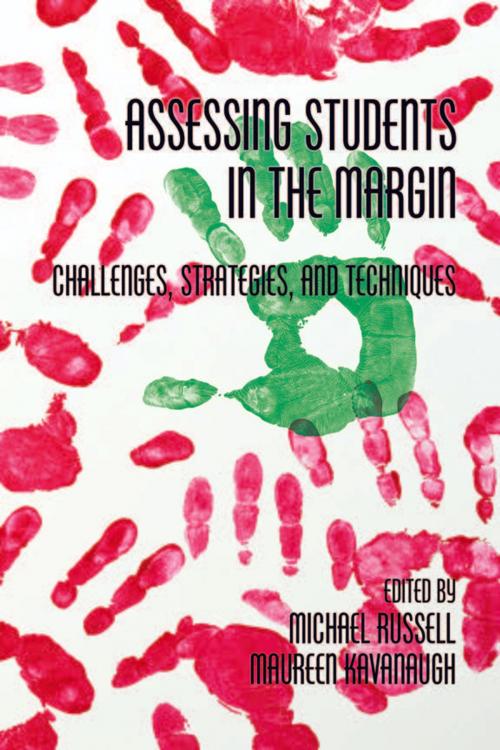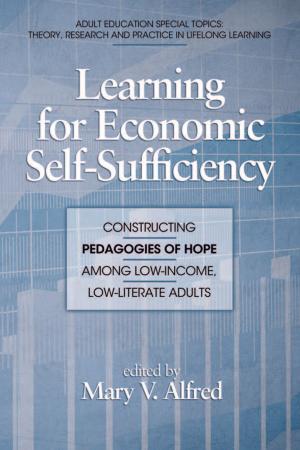Assessing Students in the Margin
Challenges, Strategies, and Techniques
Nonfiction, Reference & Language, Education & Teaching, Educational Theory, Testing & Measurement, Teaching, Teaching Methods| Author: | Michael Russell, Maureen Kavanaugh | ISBN: | 9781617353161 |
| Publisher: | Information Age Publishing | Publication: | February 1, 2011 |
| Imprint: | Information Age Publishing | Language: | English |
| Author: | Michael Russell, Maureen Kavanaugh |
| ISBN: | 9781617353161 |
| Publisher: | Information Age Publishing |
| Publication: | February 1, 2011 |
| Imprint: | Information Age Publishing |
| Language: | English |
The importance of student assessment, particularly for summative purposes, has increased greatly over the past thirty years. At the same time, emphasis on including all students in assessment programs has also increased. Assessment programs, whether they are largescale, districtbased, or teacher developed, have traditionally attempted to assess students using a single instrument administered to students under the same conditions. Educators and test developers, however, are increasingly acknowledging that this practice does not result in valid information, inferences, and decisions for all students. This problem is particularly true for students in the margins, whose characteristics and needs differ from what the public thinks of as the general population of students. Increasingly, educators, educational leaders, and test developers are seeking strategies, techniques, policies, and guidelines for assessing students for whom standard assessment instruments do not function well. Whether used for highstakes decisions or classroombased formative decisions, the most critical element of any educational assessment is validity. Developing and administering assessment instruments that provide valid measures and allow for valid inferences and decisions for all groups of students presents a major challenge for today’s assessment programs. Over the past few decades, several national policies have sparked research and development efforts that aim to increase test validity for students in the margins. This book explores recent developments and efforts in three important areas. The first section focuses on strategies for improving test validity through the provision of test accommodations. The second section focuses on alternate and modified assessments. Federal policies now allow testing programs to develop and administer alternate assessments for students who have not been exposed to gradelevel content, and thus are not expected to demonstrate proficiency on gradelevel assessments. A separate policy allows testing programs to develop modified assessments that will provided more useful information about achievement for a small percentage of students who are exposed to gradelevel content but for whom the standard form of the gradelevel test does not provide a valid measure of achievement. These policies are complex and can be confusing for educators who are not familiar with their details. The chapters in the second section unpack these policies and explore the implications these policies have for test design. The third and final section of the book examines how principles of Universal Design can be applied to improve test validity for all students. Collectively, this volume presents a comprehensive examination of the several issues that present challenges for assessing the achievement of all students. While our understanding of how to overcome these challenges continues to evolve, the lessons, strategies, and avenues for future research explored in this book empower educators, test developers, and testing programs with a deeper understanding of how we can improve assessments for students in the margins.
The importance of student assessment, particularly for summative purposes, has increased greatly over the past thirty years. At the same time, emphasis on including all students in assessment programs has also increased. Assessment programs, whether they are largescale, districtbased, or teacher developed, have traditionally attempted to assess students using a single instrument administered to students under the same conditions. Educators and test developers, however, are increasingly acknowledging that this practice does not result in valid information, inferences, and decisions for all students. This problem is particularly true for students in the margins, whose characteristics and needs differ from what the public thinks of as the general population of students. Increasingly, educators, educational leaders, and test developers are seeking strategies, techniques, policies, and guidelines for assessing students for whom standard assessment instruments do not function well. Whether used for highstakes decisions or classroombased formative decisions, the most critical element of any educational assessment is validity. Developing and administering assessment instruments that provide valid measures and allow for valid inferences and decisions for all groups of students presents a major challenge for today’s assessment programs. Over the past few decades, several national policies have sparked research and development efforts that aim to increase test validity for students in the margins. This book explores recent developments and efforts in three important areas. The first section focuses on strategies for improving test validity through the provision of test accommodations. The second section focuses on alternate and modified assessments. Federal policies now allow testing programs to develop and administer alternate assessments for students who have not been exposed to gradelevel content, and thus are not expected to demonstrate proficiency on gradelevel assessments. A separate policy allows testing programs to develop modified assessments that will provided more useful information about achievement for a small percentage of students who are exposed to gradelevel content but for whom the standard form of the gradelevel test does not provide a valid measure of achievement. These policies are complex and can be confusing for educators who are not familiar with their details. The chapters in the second section unpack these policies and explore the implications these policies have for test design. The third and final section of the book examines how principles of Universal Design can be applied to improve test validity for all students. Collectively, this volume presents a comprehensive examination of the several issues that present challenges for assessing the achievement of all students. While our understanding of how to overcome these challenges continues to evolve, the lessons, strategies, and avenues for future research explored in this book empower educators, test developers, and testing programs with a deeper understanding of how we can improve assessments for students in the margins.















